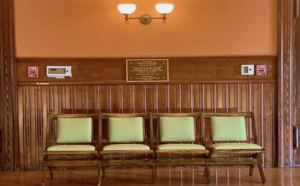PROVINCETOWN — The tax on short-term rentals has generated a financial windfall for the four Outer Cape towns, newly released figures from the state show. The added revenue for the past year totals $4.45 million, with Provincetown netting a cool $2 million for fiscal 2021, from July 1, 2020 to June 30, 2021.
Eastham brought in $936,000; Wellfleet, $829,000; and Truro, $686,000.
Eleven years have passed since Provincetown’s voters first asked the legislature for the short-term rental tax. Gov. Charlie Baker signed the law in 2018, but the start date for the new tax was July 1, 2019 — and for the first 12 months, the state Dept. of Revenue (DOR) didn’t keep track of the new money from short-term rentals as distinct from the previously existing tax on hotels, motels, and campgrounds.
That is because the short-term rental tax was enacted as an expansion of the tax on hotels. Revenue from the two sources is typically reported together as “rooms tax” by both state and town governments. The state, however, is now keeping track of the revenue from each source, and the DOR provided the breakdown for the last 12 months to the Independent.
Most of that tax year was marred by Covid. Rooms tax revenue from traditional lodgings was down about 35 percent in Provincetown and Truro compared to fiscal 2019 (the last year that was entirely before the pandemic, and the last year in which only traditional lodgings were taxed). Traditional lodging revenue in Eastham was down about 50 percent.
These numbers match Cape Cod’s overall last season. According to Wendy Northcross of the Cape Cod Chamber of Commerce, the Cape’s hospitality sector averaged about 70 percent of its normal numbers last year.
The Cape’s hotels and campgrounds are now having their busiest year ever, according to Northcross. If that pattern holds, rooms tax revenue from hotels should return to normal.
Where Should It Go?
It’s the new short-term rental revenue, however, that housing advocates want to talk about.

“We fought like heck to get short-term rental tax parity,” said Northcross. “That is newfound money for our communities, and it needs to be directed into some kind of housing fund, protected from other uses.”
“All of that short-term rental tax money should be used for housing purposes,” said Jay Coburn, CEO of the Community Development Partnership (CDP) in Eastham. “It’s up to opponents of using it all to articulate why — and what their compelling needs are that can’t be met with other sources.”
Provincetown is the only Outer Cape town that was already getting major revenue from the rooms tax. Before July 2019, Provincetown was bringing in about $2.2 million a year from the tax. Truro brought in only $370,000 the year before the tax expansion, and Eastham and Wellfleet even less.
In Truro, Wellfleet, and Eastham, all rooms and short-term rental tax revenue has gone to the general fund, where it can be used for any municipal purpose. Truro voted last week to put one-third of its total rooms tax revenue in a new housing stabilization fund.
Provincetown’s select board discussed creating such a fund on June 28. Right now, rooms tax revenue is split in four directions, with none earmarked for housing: the tourism fund, general fund, capital stabilization fund, and wastewater enterprise fund.
In May, town staff proposed a new five-way split, with 13 percent of the tax revenue going to the affordable housing trust fund. If that plan had been in place in fiscal 2020, $416,000 of rooms tax revenue would have gone to housing.
Nothing New
Just two weeks after the short-term rental law passed, then-Provincetown Town Manager David Panagore argued that the revenue should go to an aggressive housing program. “We need to establish a housing department, staffed to handle the workload required to make substantial progress,” he wrote in his January 2019 budget memo.
Assistant Town Manager David Gardner told the Provincetown Banner that same month that there would be a conversation at the April 2019 town meeting about reallocating some of the tax revenue to housing.
That didn’t happen, and Panagore quit in April 2019. The budget memos from the next two years show an effort literally on pause. Acting Town Manager David Gardner wrote in 2020 that the town must be “well informed and thoughtful before taking any substantial action or making a significant policy commitment” in allocating the new tax revenue.
Provincetown’s then-Acting Town Manager Charlie Sumner wrote a nearly identical message this year. Both Gardner and Sumner said money needed to be reallocated to housing, but not until the revenue is fully predictable.
Meanwhile, select board member Louise Venden has pushed to see money directed to a housing fund. But chair Dave Abramson has argued that the board can put money only into projects, not funds, until there is a new allocation formula. Town Manager Alex Morse has assured the board that the revenue collected in fiscal 2021 can still be used for housing purposes at a fall or spring town meeting.
In the meantime, the pause had consequences. A million dollars of “excess revenue” came in during the first 12 months of the new tax — fiscal 2020 — and $354,000 of that total went into the tourism fund, following the old allocation formula. About a quarter million went into the general fund and the same amount to the capital stabilization fund.
Where did that money end up?
Infrastructure at Provincetown Airport got $55,000 from the tourism fund, and another $145,000 went to upholstered seats for the historic benches in town hall auditorium. In other words, the “excess revenue” has been transferred out of the tourism fund already — just not for housing.
“The budget is the most important policy document in a town,” said the CDP’s Coburn. “You can have all the studies and committees you want. It really comes down to how you are using resources.”
Editor’s note: This article has been revised and expanded from the version that appeared in print in the July 8, 2021 edition.



